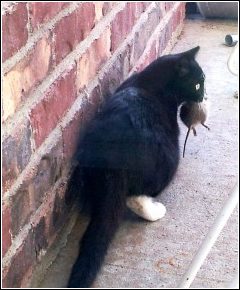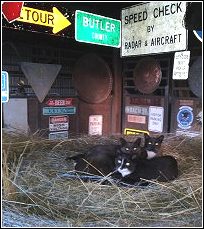Feral Cat Trapping And Removal
Hazards Related To Trapping Cats
If you have ever live trapped a cat, feral or not, you may know what can happen. Cats do not always appreciate traps and become frantic while in a trap. Bloodied faces, ripped out claws, cuts and scrapes will possibly occur. We do not take trapping lightly, we use thick leather gloves lined with Kevlar and they are reinforced with stainless steel bars - cats have, can and will bite right through these professional gloves.
We would much rather handle an upset coyote or raccoon than a feral cat. Their erratic, unpredictable behavior, in our opinion, makes them more dangerous than any other animal we handle.
If you do decide to trap a feral cat yourself, beware, it can be dangerous.
You will also want to check local and state laws prior to trapping cats. It is not legal to do so in all areas. Just the same, even when it is legal - think twice. Besides the element of danger, the cat you trap may actually belong to somebody. You could also be sued for the value of that cat, or the cost of the associated veterinarian bills.

If you are trapping wild cats in order to have them taken to a feral colony or because you plan to have them "fixed" and released again (otherwise known as a "TNR program" Trap-Neuter-Return), place your traps on a pedestal table. When cat trapping, use a species specific lure such as Wild Cat. Placing this lure in the traps on tables will help you avoid "non-target" animals. Or call us, and we can help you with the project.
Available Cat Trapping Services
Whether a cat has made a home under your house, or your neighbor is feeding a huge cat colony that is also attracting skunks, raccoons and opossums; The Wildlife Whisperer is willing and able to assist you with your feral and outdoor cat problems - it doesn't matter, if you are a business owner, a home owner or a "crazy cat lady" - we can help.
Please do not ask us to trap and kill the cats you are calling about, as we will not do that, neither will we target cats with collars and ID tags. But we can assist in one of the following manners:
There are places that offer very inexpensive operations to "fix" the cats and vaccinate them so that they can be returned to the area they came from, therefore no longer allowing them to multiply. This is not the best solution, but research has proven that it is more effective than killing them all repeatedly because when one is removed, another typically takes its place, just like wildlife. TNR cannot legally be done in some towns, such as in Tulsa city limits. We must operate within legal restraints when assisting homeowners and businesses TNR, and therefore we cannot do it in all locations.
Although this is not the ideal situation for the cats and it can be difficult to find a person wanting barn cats, this is an option for taking cats out of a bad or potentially bad situation and saving the cats from a death row sentence via animal control's waiting list. Many unwanted stray cats find homes in barns and do very well, as seen in this photograph of Bruha's barn.Bruha found that the hay and straw needed for his goats, donkey and boarding horses attracted mice and his cat colony did a fine job of getting rid of the resulting rodent problems. Note the notched ears indicating that these cats have been to the vet, have had all their shots & have been "fixed". If you see cats with an ear tip missing, now you know what it means!
The Wildlife Whisperer has found great forever homes for countless dozens of feral cats and kittens via networking with cat rescues.
Sadly, we have and will continue to encounter some stray cats with body parts missing, severely ill or injured cats and cats with bones showing. In some cases, the most humane thing to do is to end their suffering.
For information on how to feed and house outdoor cats without attracting and feeding wildlife, please visit our page on feral and stray cats.
Make Sure The Company You Hire Does Not Use Cruel Methods
Some people think cats are, and always will be, a nuisance and will do anything to get rid of cats. This story covers a wildlife removal company who still was allowed to keep his trapping permit after being caught using leg hold traps and killing cats. Read the Story
1242 SW Pine Island Rd., Suite 310
Cape Coral, Florida 33991-2126
help@totalwildlifecontrol.com


















